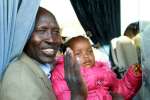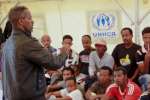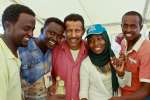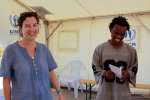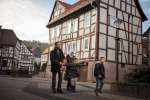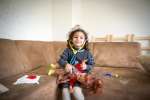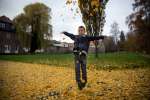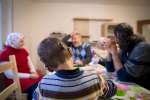It's a long way from Myanmar for Karen refugees
News Stories, 28 January 2008

CASTLEBAR, Ireland, January 28 (UNHCR) – After three months in Ireland, Sa Nga and his family are struggling to master the English language but say their new home offers many more opportunities than a refugee camp in Thailand.
The former driver, his wife, six children and father-in-law are among the first ethnic Karen refugees from Myanmar accepted for resettlement by Ireland. They are starting new lives in the scenic north-west after last year leaving the confines of Ban Don Yang camp in the tropical forests of Thailand.
The minority Karen have suffered persecution for decades and nearly 140,000 are living in closed Thai refugee camps after fleeing across the border. The Thai government, which does not let them leave the camps, now accepts that the Karens are unlikely to be able to go back to Myanmar any time soon and has accepted resettlement as a solution for some of them.
UNHCR has since early 2005 helped resettle more than 20,000 Myanmar refugees in Thailand – including Karens and other minority groups – in countries such as the United States, Canada, Australia, the United Kingdom, Finland, the Netherlands, New Zealand, Sweden and Norway – and Ireland.
The first 52 Karens resettled in Ireland, including Sa Nga and his family, arrived last September and were put through an eight-week orientation programme in the north-west town of Ballyhaunis in County Mayo. They were then moved to new homes nearby. A second group of 45 arrived in Ballyhaunis in December.
UNHCR Representative in Ireland Manuel Jordão recently visited Ballyhaunis and nearby Castlebar to see how the Karen families were coping with new services, schools, doctors, even things as basic as household appliances.
"Ireland has made a big effort to ensure its resettled refugees receive the best start with support and orientation, basic facts about the country, language tuition and advice on how to use services. These stepping stones will help resettled families use their own talents to make a life for themselves here," Jordão said.
"We feel we are being looked after well in Ireland and we are very grateful for that," Sa Nga told the UNHCR visitor, speaking through an interpreter at the family's new home in Castlebar.
Lack of English is the biggest hurdle that he and the others face, but they realize that they must master the language if they are to become independent. "It's very important for us to learn English," said Sa Nga's wife, Wau Dey, adding that if a family member became ill they would need to communicate with a doctor.
The Karens also understand that English will help them make the most of the opportunities in Ireland. "Irish people have many more opportunities compared to what we had in the camps," said the head of one family.
This is a sentiment echoed by others questioned by UNHCR. Life in the nine crowded government-run camps along Thailand's border with Myanmar is hard. The refugees live in cramped bamboo shelters, dependent on UNHCR and non-governmental organizations for protection, food, schooling and health care. The Thai government does not allow them outside for work or higher education.
The UN refugee agency hopes Ireland will accept more people for resettlement in the future. Ireland increased its annual resettlement quota from 40 to 200 in 2006, but there has been no increase since.
"UNHCR always needs more resettlement places, so I am always going to be asking for an increase in the Irish quota," Jordão said, while adding that "it also only makes sense to ask for an increase if the Irish authorities tell me it would be manageable for them."
In 2008, UNHCR expects to refer some 60,000 people for resettlement in about 20 countries that accept vulnerable refugees who cannot go back home or integrate in host countries. Refugees from Iraq, Myanmar and Bhutan are likely to figure prominently.
As one of the countries with a resettlement programme, Ireland "stands out as a shining example of how smaller nations can share the global responsibility to protect vulnerable refugees," said Jordão.
By Steven O'Brien in Dubin, Ireland





